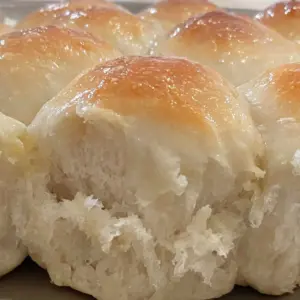
Potato Flake Sourdough Dinner Rolls
Make soft, fluffy, and irresistible potato flake dinner rolls by naturally rising your dough with a potato flake sourdough starter. It's a delightful twist on the traditional yeast roll, without compromising on the light texture we all crave in bread.
Equipment
- Stand mixer (optional, but it does make the process much easier).
- 9" round pan
- measuring cups and spoons
- Large bowl
- Plastic wrap
Ingredients
- 1/3-1/2 cup active starter 120 grams
- 2 1/2 tablespoons sugar (37 grams)
- 2 1/2 tablespoons cooled melted butter (30 grams)
- 1 teaspoon salt
- 1/2-2/3 cup warm water (118-142 grams)
- 2 cups bread flour (307 grams)
Instructions
- In your stand mixer or another large bowl, add all of the ingredients.
- Using a dough hook, or wooden spoon, mix the ingredients on low speed until just incorporated. Knead on medium-high speed for 8 minutes, or until smooth and elastic) Finish off by using your hands to form it into a ball shape.
- Cover with plastic wrap, and leave out to rise for 8-10 hours, or until doubled or almost doubled.
- After it has completed the first rise, or bulk ferment, punch down the dough and shape into a tight ball.
- Grease your 9" round pan. Divide dough into 16 equal parts, a kitchen scale is very helpful if you have trouble eye-balling it, like I sometimes do! Form each into a ball and place into the baking pan. Cover with plastic wrap (I usually reuse the same plastic wrap from the bowl). Let it sit out for the second rise between 6-12 hours, or until doubled in size.
- Preheat the oven to 350 degrees and bake for 20-25 minutes or until golden brown on the tops. Brush with butter and enjoy!
Notes
Use an active starter (has been fed and is nice and bubbly on top)
Don't add hot water, it should be warm, otherwise it will kill your starter. (It should be around 100 degrees if you like to be exact)
Sugar will work best, but could also be substituted with honey, although it will be stickier and might need a bit more flour added.
Stir your starter before pouring out to make sure all of the starter is incorporated well.
Using plastic wrap is better than covering with a tea towel, it holds in the moisture and keeps your dough from drying out.
All purpose flour can be used in place of bread flour, but it will not yield a roll as light and fluffy as if it were made with bread flour.